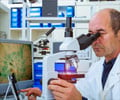University College London (UCL) is for the first time offering tests that can detect a raised risk of breast, ovarian, and prostate cancer to people without family histories of the diseases.
Now, all those who fear they may be suffering a raised risk of breast, ovarian, and prostate cancer (sans any family history of these diseases) can opt to undergo cancer-detection test offered by the University College London (UCL).
The test is part of a programme paving the way for a new approach to preventive medicine involving widespread screening.It is expected to prompt greater demand for screening of embryos by parents who want to avoid passing on an inherited defective gene to their children.
The programme comes in the wake of the birth of one of the world's first babies selected to be free of a genetic risk of breast cancer, which has been announced by Paul Serhal, medical director at University College Hospital's Assisted Conception Unit.
The baby girl was born after embryos were screened to exclude the faulty BRCA1 gene.
According to the doctors, all of her father's female relatives had developed breast cancer caused by BRCA1, the gene that gives a woman an 80 per cent chance of developing breast cancer in her lifetime.
This gene also raises the risk of ovarian and prostate cancer.
Advertisement
The UCL screening programme is said to be concentrating on the London community of Ashkenazi Jews, who have a high risk of inheriting BRCA1 and BRCA2.
Advertisement
Up to 50 per cent of people with the faulty genes do not have a family history of the diseases, largely because the gene can be carried by men.
Source-ANI
TAN/L















